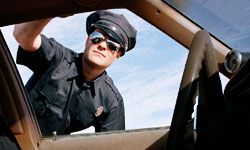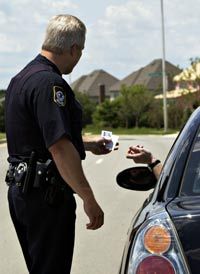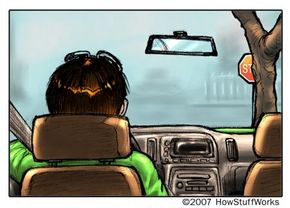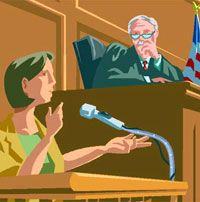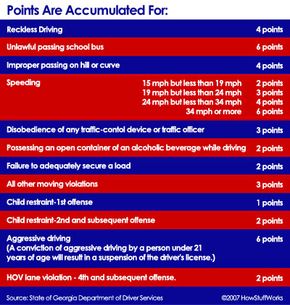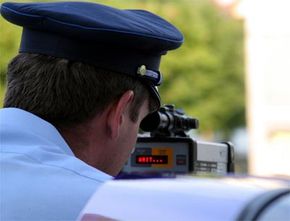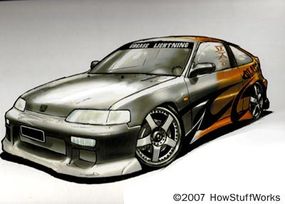The United States is a country that loves to drive. Although cities such as New York and Washington D.C. have excellent public transportation systems, millions of Americans still drive as part of their daily commute. And even though most drivers are licensed, having passed a written test and a driving exam, many drivers make occasional mistakes, while some openly flout the law. The result is that millions of traffic tickets are issued in the United States every year. With the fines for many tickets costing more than $100, that makes traffic tickets a billion dollar industry. Some critics of the traffic ticket system say that it doesn't ensure safety and only encourages police officers to satisfy ticket "quotas." Even so, tickets are intended as a deterrent and knowing how traffic tickets work is important whether you're fighting a ticket in court or trying to better understand the traffic laws. In this article, we'll look at how traffic tickets work, the different types of offenses and what to do when you're pulled over by a police officer. We'll also pass along some tips on how to avoid tickets and how to contest a ticket in court.
Types of Traffic Offenses
Generally traffic law is broken up into infractions and violations. An infraction is an offense that is not considered a crime and its penalty is a fine. A person who is guilty of an infraction can't be jailed, receive large fines, have a jury trial or a court-appointed lawyer. Most traffic tickets, such as non-moving violations and non-dangerous moving violations, are infractions. Some speeding tickets can still be relatively large, as many states determine the fine based on how many miles per hour beyond the speed limit the offender was driving.
Advertisement
A violation is more severe than an infraction, and though its definition differs between states, it is usually considered a crime. More serious violations are classified as misdemeanor or felony traffic violations. These include DUI, reckless driving, driving without auto insurance and failure to stop at the scene of an accident. Suspects who are charged with a misdemeanor or felony traffic violation have all the normal rights afforded to criminal defendants. They undergo the booking and bail processes and have the right to a jury trial and a court-appointed attorney.
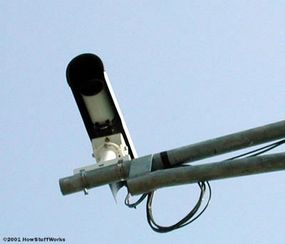
An offender will usually be charged with a misdemeanor or felony if the traffic violation caused, or threatened to cause, injury to a person or property damage. A traffic offense can move from infraction to violation, depending on the circumstances. For example, running a stop sign may only be an infraction, but if running a stop sign results in a pedestrian getting hit, the infraction may be classified as a misdemeanor or even a felony. A felony is a serious crime. If convicted of a felony, at a minimum, you would face a year imprisonment. A felony can also result in a death sentence. Repeat DUI, hit and run and vehicular homicide are all examples of felonies.
Traffic law differs from state to state, so it's important to familiarize yourself with the laws where you live. Still, in most states, there are three basic types of traffic offenses.
- Strict Liability Offenses Whereas many serious crimes require proof of "criminal intent" to convict someone, the only proof needed to convict someone of a strict liability offense is that the person committed the act. Examples of strict liability offenses include driving with a broken or burned-out headlight, making an illegal U-turn, neglecting to yield or use a turn signal or parking in a handicap space without authorization. For most people, the most familiar strict liability offenses are speeding and letting the time on a parking meter expire.
- Moving and Non-moving Violations The names of these types of violations offer a good idea of what they encompass. A moving violation refers to a traffic violation committed by a moving vehicle while a non-moving violation is related to a car that is not in motion. Generally moving violations are considered more severe -- and the fines are higher -- than for non-moving violations because of the potential for an accident or other dangers. Moving violations include running a red light or stop sign, DWI/DUI and speeding. Tickets for non-moving violations are usually for parking violations, such as parking more than 18 inches from a curb, parking in front of a fire hydrant, parking in a no-parking zone or parking beside an expired meter. Illegal vehicle modifications or faulty equipment can also merit a ticket for a non-moving violation. If your window tint is darker than the law allows or if you have illegal lights on you car, a police officer may issue you a ticket. These infractions count as non-moving violations no matter if you received the ticket while parked or after being pulled over by an officer.
Now that we've gone over ticket types and some of the legal facts surrounding traffic tickets, let's consider what to do when you're pulled over by a police officer.
